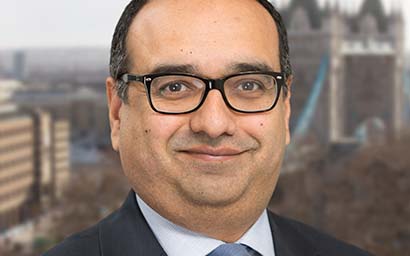Recent financial uncertainties have driven asset managers to re-examine the case for service outsourcing, SGSS’s Sarj Panesar tells Funds Europe.
Just as a health crisis may be the trigger for advances in preventative medicine, so the coronavirus pandemic has prompted changes in the asset management industry that may deliver a safer and more efficient environment in the longer term.
The global pandemic has forced asset management companies to look closely at strategies for digital transformation, for supporting ESG investment and for managing regulatory change, according to Sarj Panesar, Global Head of Business Development for Asset Managers at Societe Generale Securities Services (SGSS).
With the industry adapting at short notice to remote working, it has been forced to address fundamental questions about how it does its daily business. This extends from the simple but vital question of how to provide contract verification in a digital environment – after years of requiring a pen and ink signature, legal departments adjusted quickly to use of electronic confirmation – to the challenge of maintaining business continuity planning standards when so many locations have been affected by Covid-19.
In the short term, this has required asset managers to spend on contingency planning, infrastructure and operational support when, ideally, they would target resources to build assets under management and deliver investment outperformance to their clients.
With this in mind, asset managers are reassessing areas where they can potentially outsource, enabling them to translate fixed into variable costs and to source best-in-class services from a specialist third-party provider.
One example is in the area of ESG investment, where asset managers are under scrutiny from fund boards, and often from financial regulators, to verify that they are meeting their ESG obligations.
In 2015, France became the first country globally to impose a carbon reporting requirement on financial institutions demanding, inter alia, that firms conduct a CO2 impact analysis for securities held in their portfolios.
A major challenge
As other national authorities have introduced comparable requirements, this has presented a major implementation challenge for firms that do not have an established ESG infrastructure and reporting process, particularly given the lack of data standardisation in the ESG segment.
To support this activity, SGSS has developed an ESG solution which plugs into its front-to-back “CrossWise” platform, offering a pre-trade ESG tool which screens securities prior to execution and a post-trade reporting platform which helps asset managers to verify the ESG rating of their portfolios.
The pandemic has also highlighted the importance of efficient liquidity management. During the early weeks of the crisis, some investors were confronted with high demand for liquidity to meet margin calls in rapidly moving markets. Subsequently, many investment companies have managed economic uncertainty by retaining large cash holdings and they are looking for capital protection until ready to reallocate this into higher-yielding asset classes. This is driving demand for third-party liquidity management solutions from asset managers that do not have a sophisticated in-house treasury and cash management division.
Asset owners have been looking closely at the performance of share-class FX hedging programmes as market turbulence has tested the resilience of their risk management strategies. High levels of volatility during March and April revealed significant divergence in performance across share classes, when the FX impact on performance should, in theory, have been largely hedged out. With this, fund boards are re-examining the FX execution, timing and performance attribution applied by their asset managers to identify cases where this has fallen short. In turn, asset managers are monitoring how service performance varies across the market to ensure they are getting the best FX services available, whether in-house or from an external service partner.
Overarching these business challenges, asset managers have continued to manage a busy regulatory timetable throughout 2020 with deadlines under the EU Central Securities Depository Regulation, the Securities Finance Transaction Regulation and the second Shareholder Rights Directive foremost in a list of regulatory commitments which have demanded attention. “SGSS has been working closely with asset managers to ensure they are well prepared for pending deadlines, even in cases where there is a possibility that policymakers may delay the enactment timetable,” says Panesar.
© 2020 funds europe





